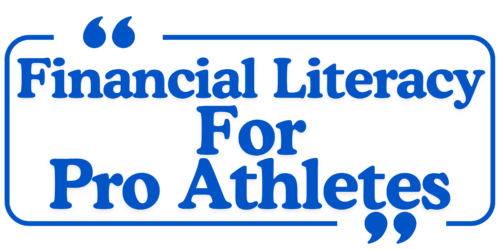Financial literacy is crucial for everyone, but it holds particular significance for professional athletes. With the potential for significant earnings, the unique pressures of fame, and the reality of a short career span, understanding financial principles can mean the difference between wealth and financial instability. Here’s a closer look at why financial literacy is essential for pro athletes, from rookies to veterans.
1. Understanding Income Sources
Pro athletes often have multiple income streams, including salaries, bonuses, endorsements, and appearance fees. As rookies, many are thrust into the financial spotlight for the first time. A solid grasp of financial literacy helps athletes understand how these different income sources work, including taxes, withholdings, and potential deductions.
Key Takeaway: Financial literacy equips athletes to make informed decisions about their income and understand how much they can realistically save and invest.
2. Budgeting for the Future
The transition from college or high school to the professional level can lead to a drastic increase in income. However, many athletes are unprepared for managing this newfound wealth. Learning how to budget is vital for ensuring that they can live within their means and plan for the future.
Rookies, in particular, should focus on establishing a budget that accounts for living expenses, training costs, and saving for future needs. Veterans, on the other hand, may need to adjust their budgets based on lifestyle changes, such as retirement planning or increased family expenses.
Key Takeaway: Effective budgeting can help athletes maintain financial stability throughout their careers and avoid lifestyle inflation.
3. Investment Knowledge
Understanding investment options is crucial for athletes seeking to grow their wealth. Financial literacy allows athletes to make informed decisions about where to invest their money, whether in stocks, real estate, or business ventures. It also helps them recognize the risks and rewards associated with various investment vehicles.
For rookies, it’s essential to understand the fundamentals of investing, while veterans might want to explore advanced strategies to protect and grow their wealth. Being educated about investments can prevent costly mistakes that often stem from misinformation or a lack of knowledge.
Key Takeaway: Financial literacy empowers athletes to make strategic investment decisions, maximizing their wealth and financial security.
4. Navigating Contracts and Negotiations
Contracts are a significant aspect of an athlete’s career, from player agreements to endorsement deals. Financial literacy helps athletes understand the terms and implications of their contracts, ensuring they negotiate effectively and secure the best possible terms.
Rookies need guidance on the basics of contracts, including key elements such as bonuses, guarantees, and performance incentives. Veterans, on the other hand, can benefit from understanding how to leverage their experience and reputation in contract negotiations.
Key Takeaway: Financial literacy enhances an athlete’s ability to negotiate favorable contract terms, ultimately leading to increased earnings.
5. Understanding Taxes and Financial Obligations
Professional athletes often face complex tax situations due to their earnings, endorsements, and varying state tax laws. A solid understanding of tax implications can help athletes avoid legal issues and manage their financial obligations more effectively.
Rookies must learn about tax brackets, deductions, and the importance of working with a qualified accountant. Veterans may need to focus on tax strategies to maximize their wealth and minimize liabilities as they approach retirement.
Key Takeaway: Financial literacy helps athletes understand their tax responsibilities and take advantage of legal strategies to reduce tax burdens.
6. Planning for Retirement
While many athletes earn significant salaries during their careers, the reality is that most will not play professionally for long. Financial literacy is essential for planning for life after sports, whether that means saving for retirement or exploring new career opportunities.
Rookies should start thinking about retirement savings early, establishing plans that ensure they’re set for the future. Veterans, particularly those nearing the end of their playing careers, need to focus on transitioning their financial plans to secure their long-term financial health.
Key Takeaway: Financial literacy aids athletes in planning for retirement, ensuring they have the resources they need when their playing days are over.
7. Avoiding Financial Pitfalls
The sports world is not without its share of financial pitfalls, from bad investments to scams targeting athletes. A solid foundation in financial literacy helps athletes recognize warning signs and make sound financial decisions.
Rookies can benefit from education on common financial traps, while veterans should focus on strategies to protect their wealth and make informed decisions in an often volatile financial landscape.
Key Takeaway: Financial literacy can help athletes avoid common financial mistakes, preserving their wealth and financial stability.
Conclusion: The Lifelong Importance of Financial Literacy
For professional athletes, financial literacy is not just a one-time lesson; it’s a lifelong journey. Understanding money management, investment strategies, contract negotiations, tax obligations, and retirement planning is crucial for ensuring financial security and success both during and after their athletic careers.
Whether a rookie just starting in the league or a veteran approaching retirement, financial literacy provides the knowledge and skills needed to navigate the complexities of personal finance. By prioritizing financial education, pro athletes can secure their financial futures, avoid common pitfalls, and ultimately thrive long after their playing days are over.
Written by Pat Brown, MBA
